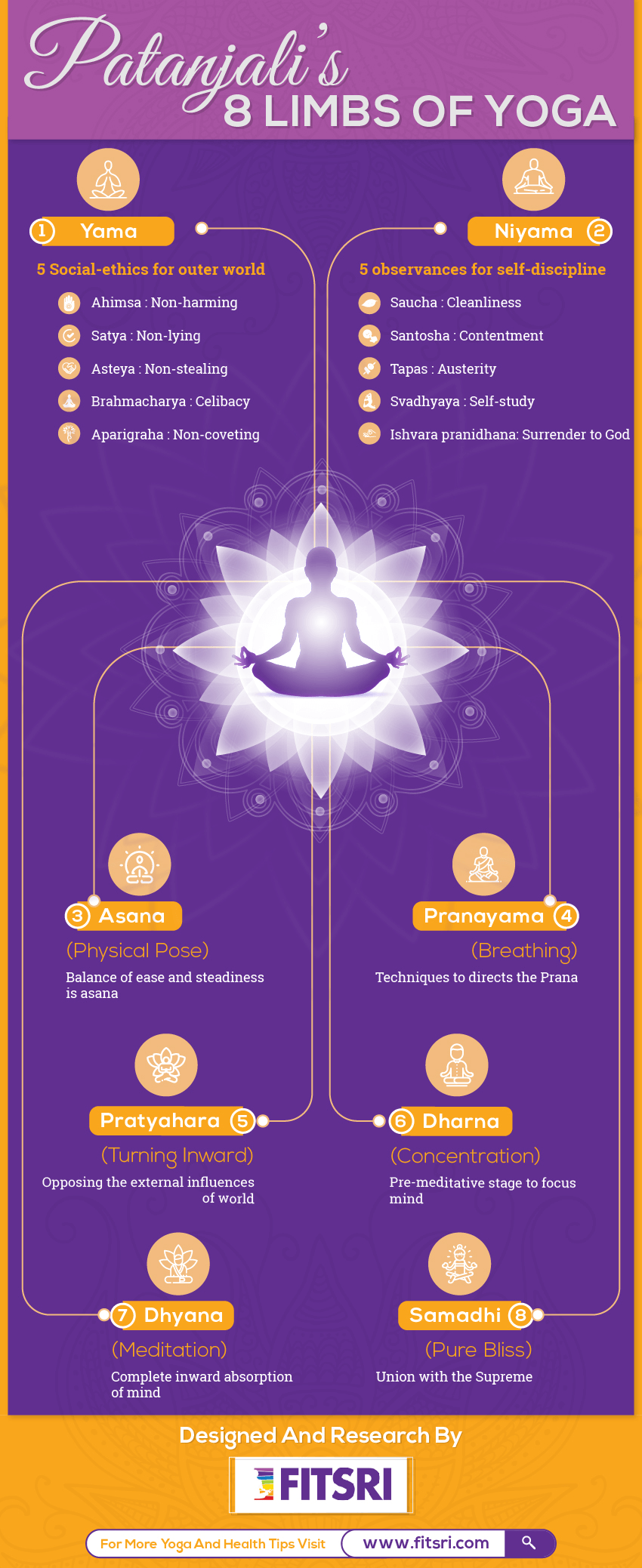
Overview
There is a thin line between need and greed; Aparigraha teaches us not to cross that line.
Aparigraha in the most simple terms is the practice of non-possessiveness. It is the freedom from the illusion of possession. We are constantly drowning in a turbulent sea, of wants and desires. Wants and desires, that blindfold us from the simplicity of happiness. Everything we ever want to possess is simply with the hope, that it will make us happy? But does it really?
It does nothing but gives us a temporary sense of well-being, which soon evaporates, only to leave us wanting for more. Over time leaving us addicted to this vicious circle of wanting and possessing. Aparigraha is a way out of this vicious circle.
There are two fundamental ideas to happiness, which you must understand in order to practice Aparigraha.
- Firstly, the more desperately you search for happiness, the more it will elude you.
- And secondly, happiness is an intensely pleasurable and ecstatic sensation that makes you smile all the time. That is a very wrong notion of happiness. Maybe, it’s correct in literary sense, but not in the sense as life means it to be.
In life, happiness is the subtle sense of well-being where you lack any remorse, regret, or want, and that is in true sense shows the meaning of Aparigraha.
Aparigraha Meaning in Yoga
The word graha means “to grab”, and pari means “on all sides.” So this would give the word Parigraha means accepting worldly possessions of all types. When a prefix “A” is added it simply works as a negation. Thus the word Aparigraha means non-acceptance of all types of worldly possessions.
The modern yoga we follow mostly has taken from The Yoga Sutras compiled by sage Patanjali in 400 CE. The texts speak of eight limbs of yoga, which are like eight moral practices that give yoga its iconic holistic and spiritual nature. Aparigraha is the ‘5th part’ of the first limb of yoga called Yama.

The 5 Yamas are practices for Self-restraint for a yogi. It includes;
- Ahimsa – ‘Nonviolence’
- Satya – ‘Truthfulness’
- Asteya – ‘Non-stealing’
- Brahmacharya – ‘Continence’ or ‘Right use of energy’
- Aparigraha – ‘Non-attachment‘
The last of 5 Yamas, Aparigraha encompasses a whole range of physical and psychic non-possessive behavior. The very basic of which is not taking more than you need to survive. Non-greediness, non-attachment of the physical world, non-accumulation and non-acceptance, all come under the umbrella of Aparigraha.
Yogis who seclude themselves completely from the social life, are needed to follow an absolute version of Aparigraha. So much so, that even in their basic necessities like food, clothing, and shelter, they choose the bare minimum.
Aparigraha as the 5th (or last) Yama
The arrangement of the Eight Limbs and the arrangement of each of ‘5 Yamas’ is not random. Aparigraha is the Last Yama for a reason. Yama is self-restraint, and the things you need to restrain from are some form of a worldly possession or the other. Thus once you master non-acceptance of worldly possessions, Yama will automatically be achieved.
Now the path to the mastery of Aparigraha leads through the mastery of the previous four Yama. Non-harming thoughts, words, and actions can be practiced by Ahimsa, then comes the truthfulness and honesty or Satya, then elimination of jealousy and stealing or Asteya, and then absolving sexual infidelity is called Brahmacharya. It will all lead to the attainment of Aparigraha.
Differentiate physical from psychic Aparigraha
The physical aspect of each Yama is pretty clear and simple. Worldly possessions like wealth, land, financial resources and such, are physical in nature. However, there are other forms of worldly possessions like power, influence, and respect. Accumulation of these psychic elements is also strictly prohibited in Aparigraha. If you look at it, psychic Aparigraha is the truest way to install equality in society.
Benefits of Practicing Aparigraha

Aparigraha completes the process of Self-restraint, Yama, that starts with Ahimsa. You will transform into an embodiment of willpower, commitment, and determination. Your mind will be free from worldly distractions, and you will finally start appreciating the subtleties of different universal creations.
On practicing Aparigraha;
- You will learn to let go of remorse and regret.
- You will be free of stress.
- You will be free of insecurities.
- You will stop feeling disappointed in the actions of others.
- You will be hard to bribe and corrupt.
- You will be fair, just, and equal to all.
- You will develop an inspirational character, and as Mahatma Gandhi said, you will be able to shake the world gently.
How to Practice Aparigraha?
The instructions to follow Aparigraha are pretty simple. However, such direct actionable instructions are useless. They will do you no good, at least not on their own. It’s easy to say, “learn to forgive,” but how to forgive? That is the real question. And that is the help you need.
You know you should not want more, but there are generations of evolutionary genetics coded deep into your DNA, that compulses you to want more. So how do you stop wanting more? Let’s try to build a bridge between philosophy and action.
1. If you love, you will forgive

A basic instruction you will find to follow Aparigraha is that you need to forgive; yourself and others. This will help you get rid of the psychic worldly possessiveness. However, if you focus directly on forgiving, you will never forgive. Focus on loving, and loving is simple. Make it a constant practice to overlook the shortcomings and highlight the positives. You will naturally fall in love with a thing, animal, or person.
Focus on the goodness still left in humanity. Read up on inspiring autobiographies. Follow philanthropic endeavors, and even involve with some to bask in the light of goodness that still exists. Keep your soul and mind distant from negative criticism, and you will find it in your heart to forgive random strangers as well.
2. Spend more time with children
Children are an abundant source of positivity and innocence. Apart from their obsession with the possession of toys and candies, and their mothers, they are almost non-possessive about everything else. And it’s not a conscious effort that they make, but their nature.
Spending enough time around children is one of the easiest ways to practice Aparigraha that will help you wake that very same innocence within you. You will remember what it was like to want nothing else but to live and be amazed by this wonderful world.
3. Let nature inspire you

Yogic practices recommended practicing Aparigraha because non-possessiveness is in the very fabric of creation itself. Look into the nature around you and you will find Aparigraha in everything. Look how the trees and plants bloom day after day, year after year. Giving us food, flowers, and fruits. We, humans, take it all away, such invaluable goods, but they continue their yield.
See how the sibling dogs quarrel, resulting in a brutal bloody fight. But the next day they lick off each other’s faces as if nothing had happened. These examples are endless and very easy to find. Look around and be inspired. If such is the rule of nature, to let go, why can’t we humans try the same?
4. Learn a musical instrument
What is music? Music is nothing but the subject that studies the scientific arrangement of sound frequencies, that when played together, can express a message or an emotion. Thus automatically when you learn a musical instrument, you will develop your emotional and auditory intelligence. And even establish a stronger bridge between the both.
In music, you will learn to analyze sounds, and with their logical arrangement, you will create emotion. Music will help you balance your sense of logic and sense of emotion. Which will further generate the reasonable state of mind required to let go of possessions.
5. Take a dance class

In dance you are always flowing, you are always moving from one beat to another. The practice of dance programs your mind in such a way that you don’t hold on to past things. Like music, dance can also be an effective therapy, to bring you on the path of Aparigraha. When you dance you prominently trigger three types of intelligence in your head. Emotional intelligence, auditory intelligence, and kinesthetic intelligence. The dance will help you develop a healthy bond between your emotions and your body. Which will of course benefit you on the path of Aparigraha.
6. Take up a paintbrush
With music, we link emotion with logic. In dance, we link emotion with the body. And in painting, you link your emotion with your visual intelligence. Practicing these three art forms will help you achieve a very balanced intelligence in life. Which is fundamental to realize the justification of Aparigraha.
Note that it is natural for most people to not excel in all three art forms equally. However, our goal here is not to become a sensational virtuoso. But to utilize the mechanisms of the art forms to evolve and balance our intelligence. So just honestly and dedicatedly practicing will suffice.
7. Take a moment to appreciate subtleties of creation

We are so lost in the glamour of wealth and the superficiality of consumerism, that we forget to notice the most obvious wonders around us. We are so amazed by the extra cheese layer on our pizza crust, that we forget to awe on the fact that, a grass transformed sunlight into a grain, that we eat.
Make it a habit to take dedicated time off, and notice such small subtleties in our surroundings that are full of wonder. And then allow yourself to be carried away by that thought. This practice will help you come to the realization that there are brighter things in this world, than our prized materialistic possessions.
8. Start practicing Contribution
Contribution is more important than success, and the day the world understands this, it will be a happier place. As long as you feel uncomfortable giving away something you consider to be yours, Aparigraha is a distant destination. It doesn’t necessarily has to be money. Sharing your food or clothes. Giving a needy shelter in your house on a chilly winter’s night. Or even lending your time, service, or skill for free, would be considered a contribution. You can sit by a homeless and give him/her some of your time. Or befriend an old person, to give him/her an occasional company. The joy it brings to them will give you eternal bliss.
9. Breathe consciously every now and then

Breathing is more important than we realize. Every once in a while we need to take deep complete breaths. This will keep your blood circulation, hormonal flow, nervous functions and metabolism in proper orders. As you go through your day, your physical stress and condition, plays an important part in determining your behaviour and mood. Breathing will keep your body and mind satisfied.
10. Practice Aparigraha on the mat
So if Aparigraha is a part of the first limb of Yoga, Yama, it must in some way relate to the most practiced third limb, Asana. And so it does. The practice of asanas is great for our health, but only if we do it appropriately. We study our practice with sincere intentions, but midway we get carried away by more of our humane mental afflictions. We start possessing ideas of self-obsession, of an attractive physique, strong appearance, and such.
In cases of group practiced, we get possessed by the idea of superiority, and we start competing with the person next to us on the mat. All these mental shortcomings throw us off our psychic balance. We lose our awareness and mind-body sync and sail through the poses haphazardly. These mental Jumbles reduce the health benefits and increase the risk of injury. As you practice your poses try concentrating only on your breathing, maybe even count them. This will help you stay on track.
Why is the idea of possessing silly?

Do we possess our possessions or do they possess us?
Possession is one of the causes of suffering of humans (Klesha), that we know in yoga as Raga or Attachment.
The very basic concept of why possessing is silly, is because nothing is yours to possess in the first place. What is the most prized possession of human beings? It is land/home. Now imagine the land you are currently living on. At the best, you and your blood relatives have been in possession of that land for a few hundred years.
But the same land you are living on has been around for 4.5 Billion years, which is the age of the earth; if not the crust, the core. So your land could have been occupied by another family and their blood relatives for thousands of years before. So which family is the true owner?
The same applies to everything else there is. Because some way or the other, everything we consume, is made from raw materials provided by the earth. And note that, the same logic extends to emphasize, that other species too have a right of ownership. Especially species like rats, who are older than homosapiens. If nature had a voice it would tell all species have an equal right on all raw materials. And thus the idea of possessing is silly!
Is Aparigraha Practical?
There is one concern however if the purest essence of Aparigraha is to be followed, a lot of dynamics in our societies will change. Forms of economies and governments will seize to mean anything. There will be an overnight crumble and widespread chaos. Probably this why people who wish to practice an absolute form of yoga, reside in seclusion. However, the Yoga Sutras itself, specific to types of practice. The absolute and the relative. The relative yogic practices are what’s practical for people living in society. In short, it will help you be your morally cleanest version possible.
Let’s take the example of Aparigraha. A yogi or yogini would wear bare minimum clothes to just cover his or her privates, live in temporary accommodations, and eat just to live and not for taste; this would be an absolute form of Aparigraha. You on the other hand will dress minimal and decent, nothing extravagant. Eat as per your hunger and taste, but not waste. And live in long-term permanent accommodation just enough comfort for you and your family.
The absolute version is very much possible if one really puts one’s heart into it. Now it’s true that Aparigraha is quite an extensive practice and time-consuming, but such is the subject. If only you had chosen something simpler, like how to lose weight! And if the difficulty breaks yours don’t worry. Remember what the wise Sufi Saint Rumi said, “you have to keep breaking your heart until it opens.”




